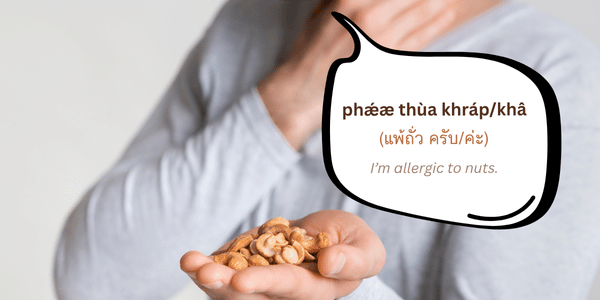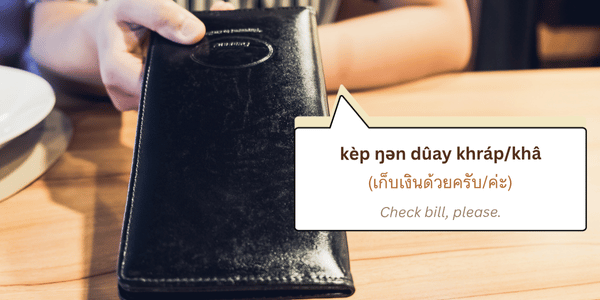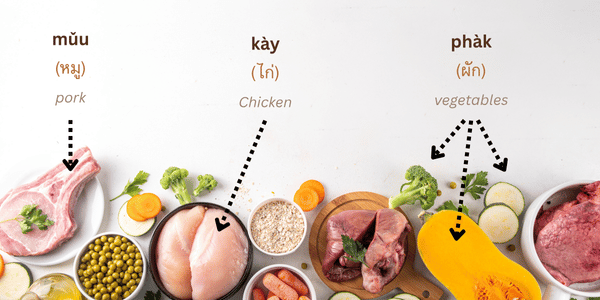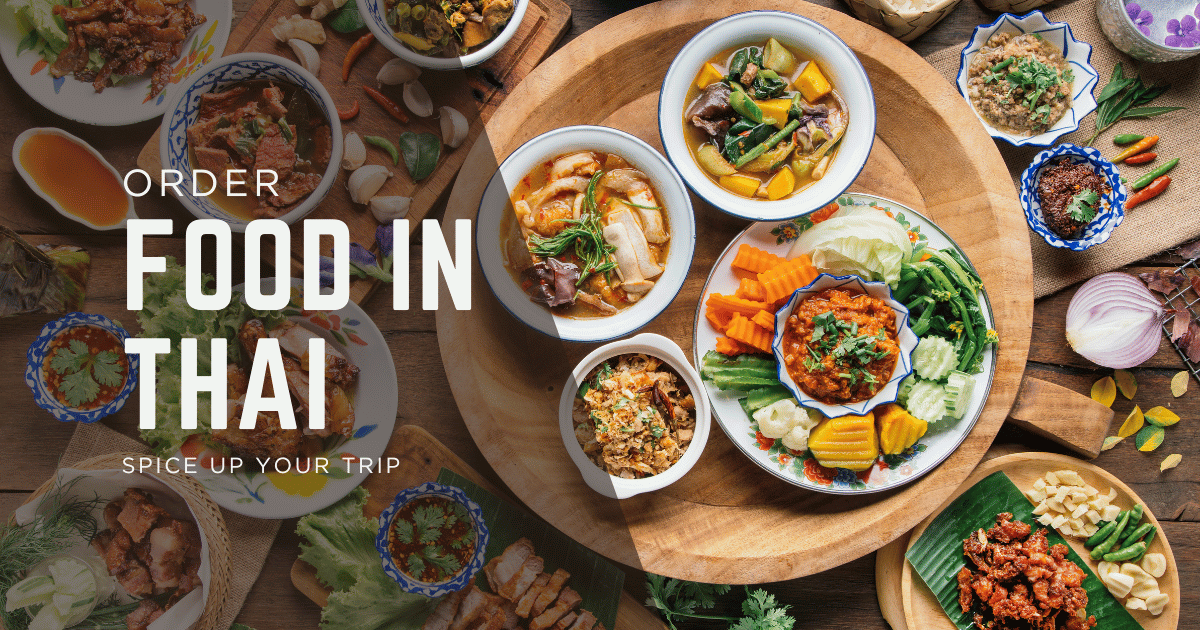Let’s order food in Thai and spice up your trip!
Thailand offers a rich experience for travelers, especially in its food culture. Many restaurants cater to tourists with English-speaking staff and menus. However, using Thai to place your order can be a delightful surprise for the wait staff. This makes your meal more enjoyable and shows respect for local culture.
This article covers essential Thai phrases you can use in restaurants, complete with Thai script, transcription, English translation, and audio tracks.
Getting Started: Greetings and Requests
At the restaurant, the waiter or waitress will come and greet you by saying:
- สวัสดีครับ (sawàtdii khráp): Hello (male speakers)
- สวัสดีค่ะ (sawàtdii khâ): Hello (female speakers)
- เชิญ ครับ/ค่ะ (chəən khráp/khâ): Please ,come in.
They will usually hand you the menu and await your order. Some may leave you until you are ready to order.
In the case that they are not standing at your table, you will get their attention by saying:
- ขอโทษครับ (khɔ̌ɔ-thôot khráp): Excuse me (male speakers)
- ขอโทษค่ะ (khɔ̌ɔ-thôot khâ): Excuse me (female speakers)
- สั่งอาหารหน่อย ครับ/ค่ะ (sàŋ ʔaahǎan nɔ̀y khráp/khâ): I’d like to order food, please.
You may hear them say, ‘What would you like to receive?’ รับอะไรดีคะ (ráp ʔaray dii khá).
Order Food in Thai

Now for the fun part – ordering! There are a couple of common ways to express what you’d like.
The most polite way to say is:
- May I have…
ขอ… ครับ/ค่ะ (khɔ̌ɔ… khráp/khâ)
For example:
May I have Pad Thai for one, please?
ขอผัดไทย 1 ที่ ครับ/ค่ะ
(khɔ̌ɔ phàt Thai nɨ̀ŋ thîi khráp/khâ)
May I have two bottles of water, please?
ขอน้ำเปล่า 2 ขวด ครับ/ค่ะ
(khɔ̌ɔ náam plàaw sɔ̌ɔŋ khûat khráp/khâ)

A more direct, but still polite, way to say is:
- I’ll take… / I want…
เอา…ครับ/ค่ะ (ʔaw… khráp/khâ)
For example:
I’ll take stir-fried basil with minced pork for one, please.
เอาข้าวผัดกะเพราหมูสับ 1 ที่ ครับ/ค่ะ
(ʔaw khâaw phàt kaphraw mǔu sàp nɨ̀ŋ thîi khráp/khâ)
I’ll take a cup of iced coffee, please.
เอากาแฟเย็น 1 แก้ว ครับ/ค่ะ
(ʔaw kaafææ yen nɨ̀ŋ kæ̂æw khráp/khâ)
Making Special Requests
Thai food is famous for its bold flavors, and some may contain ingredients you don’t eat. So, don’t be shy about communicating your preferences.
- Not spicy: ไม่เผ็ด (mây phèt)
For example,
I’ll take stir-fried basil with minced pork, not spicy for one, please.
เอาข้าวผัดกะเพราหมูสับ ไม่เผ็ด 1 ที่ ครับ/ค่ะ
(ʔaw khâaw phàt kaphraw mǔu sàp mây phèt nɨ̀ŋ thîi khráp/khâ)
- Not sweet: ไม่หวาน (mây wǎan)
For example,
I’ll take a cup of iced coffee, not sweet, please.
เอากาแฟเย็น ไม่หวาน 1 แก้ว ครับ/ค่ะ
(ʔaw kaafææ yen mây wǎan nɨ̀ŋ kæ̂æw khráp/khâ)
- A little bit / less of the flavor: นิดหน่อย (nít-nɔ̀y) / น้อย (nɔ́ɔy)
For example,
I’ll take stir-fried basil with minced pork and a little bit of spicy for one, please.
เอาข้าวผัดกะเพราหมูสับเผ็ดนิดหน่อย 1 ที่ ครับ/ค่ะ
(ʔaw khâaw phàt kaphraw mǔu sàp phèt nít-nɔ̀y nɨ̀ŋ thîi khráp/khâ)
I’ll take stir-fried basil with minced pork with less spicy sauce for one, please.
เอาข้าวผัดกะเพราหมูสับเผ็ดน้อย 1 ที่ ครับ/ค่ะ
(ʔaw khâaw phàt kaphraw mǔu sàp phèt nɔ́ɔy nɨ̀ŋ thîi khráp/khâ)
I’ll take a cup of iced coffee with a little bit of sweet, please.
เอากาแฟเย็น หวานนิดหน่อย 1 แก้ว ครับ/ค่ะ
(ʔaw kaafææ yen wǎan nít-nɔ̀y nɨ̀ŋ kæ̂æw khráp/khâ)
I’ll take a cup of iced coffee with less sweet, please.
เอากาแฟเย็น หวานน้อย 1 แก้ว ครับ/ค่ะ
(ʔaw kaafææ yen wǎan nɔ́ɔy nɨ̀ŋ kæ̂æw khráp/khâ)
Crucially, if there’s an ingredient you absolutely cannot eat or simply don’t like, you can tell them, “Don’t put… in”:
- Don’t put… in (the dish): ไม่ใส่… (mây sày…)
For example,
I’ll take Pad Thai, but please don’t put nuts in it.
เอาผัดไทย ไม่ใส่ ถั่ว ครับ/ค่ะ
(ʔaw phàt Thai mây sày thùa khráp/khâ)
I’ll take a cup of iced coffee with no sugar, please.
เอากาแฟเย็น ไม่ใส่ น้ำตาล 1 แก้ว ครับ/ค่ะ
(ʔaw kaafææ yen mây sày náam-taan nɨ̀ŋ kæ̂æw khráp/khâ)

If you are allergic to something, you should mention it.
- I’m allergic to…
แพ้… ครับ/ค่ะ (phǽæ … khráp/khâ)
For example,
I’m allergic to nuts.
แพ้ถั่ว ครับ/ค่ะ
(phǽæ thùa khráp/khâ)
I’m allergic to shrimps.
แพ้กุ้ง ครับ/ค่ะ
(phǽæ kûŋ khráp/khâ)
- I’m a vegetarian. / I’m vegan.
For example,
ผม/ฉัน กิน มังสวิรัติ ครับ/ค่ะ
phǒm/chán kin maŋsawirát khráp/khâ
ผม/ฉัน เป็น วีแกน ครับ/ค่ะ
phǒm/chán pen wiikæn khráp/khâ
During the Meal
You can ask for the menu again if you want more food or drinks.
May I have the menu, please?
ขอเมนูหน่อย ครับ/ค่ะ
(khɔ̌ɔ meenuu nɔ̀y khráp/khâ
If you want to compliment the food, you can say:
Delicious!
อร่อยมาก ครับ/ค่ะ
(ʔarɔ̀y mâak khráp/khâ)
Finishing Your Meal: Paying the Bill

When you’re ready to settle up, there are a couple of common ways to ask for the bill. “Check bill” is often understood due to English influence.
- Check bill, please
เช็คบิลด้วย ครับ/ค่ะ
(chék bin dûay khráp/khâ)
Alternatively, a more traditional phrase:
- Collect money, please
เก็บเงินด้วย ครับ/ค่ะ
(kèp ŋən dûay khráp/khâ)
Asking if you can pay by card, by saying:
- Can I pay with a credit card?
จ่ายบัตรเครดิตได้ไหมครับ/คะ
(càay bàt khreedìt dâay máy khráp/khá)
When you are leaving, the waiter or waitress will show their gratitude by saying:
- Thank you (male speaker): ขอบคุณครับ (khɔ̀ɔpkhun khráp)
- Thank you (female speaker): ขอบคุณค่ะ (khɔ̀ɔpkhun khâ)
Culturally, Thai customers usually smile back to accept their gratitude. Some people may say thank you back to the waiter or waitress. You can do the same.
Essential Words Related to Food

| Thai | Transcription | English |
|---|---|---|
| ข้าว | khâaw | rice |
| ไก่ | kày | chicken |
| หมู | mǔu | pork |
| เนื้อ | nɨ́a | beef |
| ปลา | plaa | fish |
| กุ้ง | kûŋ | shrimp |
| ปลาหมึก | plaa-mɨ̀k | squid |
| ไข่ | khày | egg |
| เต้าหู้ | tâw-hûu | tofu |
| ผัก | phàk | vegetables |
| พริก | phrík | chili |
| หัวหอม | hǔa-hɔ̌ɔm | onion |
| กระเทียม | krathiam | garlic |
| ถั่ว | thùa | peanuts |
| น้ำปลา | náam-plaa | fish sauce |
| น้ำตาล | náam-taan | sugar |
| มะนาว | mánaaw | lime |
| น้ำเปล่า | náam plàaw | plain water |
| น้ำแข็ง | náam-khæ̌ŋ | ice |
| น้ำผลไม้ | náam phǒn-la-máay | fruit juice |
| ชาเย็น | chaa yen | iced tea |
| กาแฟเย็น | kaafææ yen | iced coffee |
| เบียร์ | bia | beer |
| โค้ก | khóok | Coke |
| น้ำมะพร้าว | náam-má-phráaw | coconut water |

